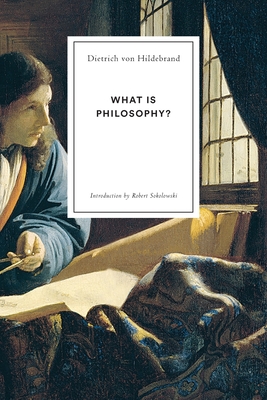What Is Philosophy?

What Is Philosophy?
What Is Philosophy? is a foundational study in epistemology by the eminent phenomenologist Dietrich von Hildebrand. Hildebrand begins by analyzing closely the receptivity that is proper to all kinds of knowledge. As a result, Hildebrand holds a robust philosophical realism according to which the mind does not impose its terms on the object known, but receives the object on the object's own terms. He does acknowledge that certain aspects of the physical world do indeed depend on the human mind, such as color qualities, but he avoids idealism by the way he embeds these qualities within things that are known in their own proper being. Perhaps the major contribution of this work lies in the account that Hildebrand gives of our knowledge of the essential structures and laws of being (what the phenomenologists called eidetic intuition). Such knowledge is inconceivable to those empiricists who think that we connect with the world only by way of empirical observation. Hildebrand shows that in addition to such observation we also possess rational insight into what things essentially are and are not. With great originality, Hildebrand examines just what kind of essential structure it is that makes possible rational insight into necessary laws of being. He also engages in debate with those empiricists who think that these necessary laws of being are reducible to tautologies. He argues that these laws are not just grounded in our word-meanings, but in the very being of things. He thus agrees with Kant that we possess necessary truths that we express in synthetic propositions; but he disagrees strenuously with Kant's idealist account of how such propositions are possible. Hildebrand's What Is Philosophy? is perhaps the most significant and nuanced work we have that defends the position of realist phenomenology.
PRP: 136.34 Lei
Acesta este Prețul Recomandat de Producător. Prețul de vânzare al produsului este afișat mai jos.
122.71Lei
122.71Lei
136.34 LeiLivrare in 2-4 saptamani
Descrierea produsului
What Is Philosophy? is a foundational study in epistemology by the eminent phenomenologist Dietrich von Hildebrand. Hildebrand begins by analyzing closely the receptivity that is proper to all kinds of knowledge. As a result, Hildebrand holds a robust philosophical realism according to which the mind does not impose its terms on the object known, but receives the object on the object's own terms. He does acknowledge that certain aspects of the physical world do indeed depend on the human mind, such as color qualities, but he avoids idealism by the way he embeds these qualities within things that are known in their own proper being. Perhaps the major contribution of this work lies in the account that Hildebrand gives of our knowledge of the essential structures and laws of being (what the phenomenologists called eidetic intuition). Such knowledge is inconceivable to those empiricists who think that we connect with the world only by way of empirical observation. Hildebrand shows that in addition to such observation we also possess rational insight into what things essentially are and are not. With great originality, Hildebrand examines just what kind of essential structure it is that makes possible rational insight into necessary laws of being. He also engages in debate with those empiricists who think that these necessary laws of being are reducible to tautologies. He argues that these laws are not just grounded in our word-meanings, but in the very being of things. He thus agrees with Kant that we possess necessary truths that we express in synthetic propositions; but he disagrees strenuously with Kant's idealist account of how such propositions are possible. Hildebrand's What Is Philosophy? is perhaps the most significant and nuanced work we have that defends the position of realist phenomenology.
Detaliile produsului










